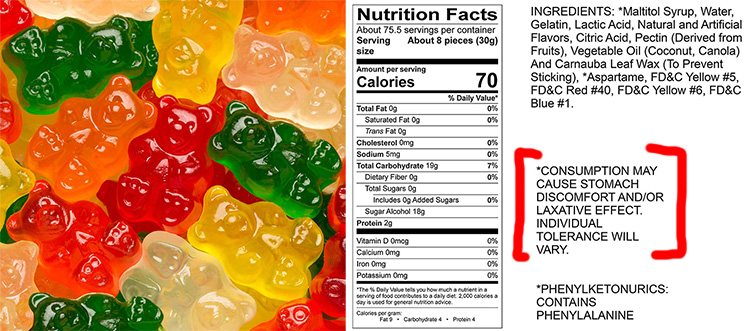Haribo Sugar-Free Gummy Bears have captivated the curiosity of many, drawn in by their promise of a guilt-free indulgence. As a popular sugar-free candy option, they claim to cater to health-conscious consumers, especially those following low-carb or ketogenic diets. However, behind the vibrant packaging and appealing flavors lies a darker narrative filled with alarming reviews and quite a few unfortunate experiences. In this article, we delve into the multifaceted discussions surrounding the infamous gummy bears, exploring their ingredients, consumer reactions, and their implications on health, self-love, and balance.

haribo sugar free gummy bears on amazon
The Allure of Sugar-Free Sweets
The market for sugar-free alternatives has been on a steady rise, driven by a societal shift towards healthier eating habits. Haribo’s sugar-free variant promises a low-calorie snack without the need to sacrifice flavor. As renowned nutritionist Dr. Lisa Young advocates, “Sugar-free options can provide a solution for those wanting to satisfy their sweet tooth while managing carbohydrate intake.” This perspective resonates strongly with individuals striving for a healthier lifestyle, often leading them to embrace the seemingly innocent Haribo Sugar-Free Gummy Bears.
The Sweet Deception
Despite the health-centric appeal, the inclusion of maltitol, a sugar alcohol used as a sweetener, has caused quite a stir. While maltitol is significantly lower in calories compared to sugar, its gastrointestinal effects are no small matter. Many consumers have reported severe digestive issues after indulging in these gummy bears, leading to widespread sharing of horror stories online. An article on Forbes aptly summarizes one such experience, stating, “For what it’s worth, Haribo included a warning on their sugar-free bears that some people might experience unpleasant side effects.”
A Glimpse Into Consumer Madness
The social media response to Haribo Sugar-Free Gummy Bears has been raucous and often humorous. Reddit users have shared their unfortunate experiences, likening their after-effects to a “cleanse” that no one willingly signs up for. One particularly vivid review titled “See you in hell, Haribo Sugar-Free Gummy Bears” gained notoriety for its animated description of the bodily aftermath. Such anecdotes have made the candy a staple of bizarre Amazon reviews, accentuating the duality of consumer experience—pleasure intertwined with trouble.
Gummy Bears and the Balance Between Indulgence and Health
As consumers grapple with the implications of such sugar-free options on their health, it brings forth a vital conversation on moderation and the pursuit of balance. Mental health and nutrition expert Dr. Samantha Ganjoo states, “Sweets can fit into a balanced lifestyle, but it’s crucial to be mindful of how they affect our bodies. Moderation is key.” This philosophy encourages individuals to focus on self-love and respect for their bodies—a message that resonates deeply in an age fixated on physical appearance and diet culture.
Expert Opinions and Ongoing Research
Nutritionists and dieticians continue to debate the viability of sugar substitutes in the diet. Dr. Michael Greger, a physician known for his advocacy of whole food plant-based diets, cautions against processed sugar alternatives, noting that “the gastrointestinal distress some experience after consuming sugar-free products speaks to a need for transparency in food labeling.” The ongoing discourse, highlighted by rigorous scientific studies, aims to empower consumers with knowledge while promoting healthier choices. As more research emerges, it becomes imperative for brands like Haribo to prioritize consumer safety in their product formulations.
Consumer Recommendations and Alternatives
For those still keen on enjoying gummy candies without the consequences often associated with their sugar-free counterparts, several alternatives are recommended. Many natural and organic brands now offer gummy candies sweetened with stevia or made with whole food ingredients, providing healthier options that align with a wellness-focused lifestyle. Additionally, adopting portion-control practices—limiting intake—has proven beneficial in navigating the consumption of such treats without adverse effects.
Fostering a Positive Approach to Healthful Eating
A relevant theme encapsulating the scrutiny of Haribo Sugar-Free Gummy Bears lies in the encouragement of a positive relationship with food. Rather than criminalizing sweets or categorizing them as “bad,” creating an environment that fosters balance paves the way for healthier food relationships. Encouraged by the mantra of “everything in moderation,” individuals can learn to enjoy treats while prioritizing their well-being.
Frequently Asked Questions:
Did they discontinue Haribo sugar-free gummy bears?
No, Haribo has not discontinued their sugar-free gummy bears. However, following the negative attention surrounding the potential gastrointestinal side effects, they have added warnings on their packaging.
What is the sweetener in Haribo sugar-free gummy bears?
The sweetener used in Haribo Sugar-Free Gummy Bears is maltitol, a common sugar alcohol that can cause digestive disturbances in some individuals.
Is there sugar-free Haribo available in other countries?
Yes, sugar-free Haribo products can be found in various international markets, including Amazon UK and others, with similar product offerings.
Do sugar-free gummy bears have carbs?
Yes, while sugar-free gummy bears are significantly lower in sugar, they still contain carbohydrates. It’s essential to read labels for specific nutritional information.
Final Thoughts
Haribo Sugar-Free Gummy Bears serve as a testament to the complexities surrounding dietary choices in modern times, illuminating the challenge of balancing enjoyment with health. Engaging with these insights allows consumers to make informed choices, equipping them to navigate the world of sweets with awareness and control. In a culture that often celebrates sugar-free indulgences, it is our responsibility to remain vigilant about what we consume and how it aligns with our personal health narratives.